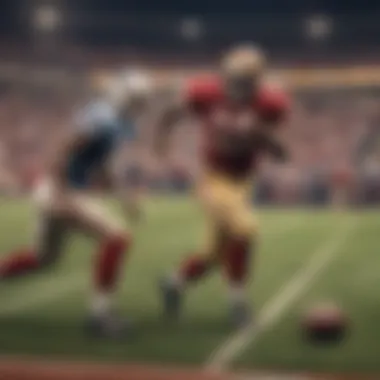The NFL and Sports Betting: A Complex Relationship


Intro
The relationship between the NFL and sports betting has been maturing for decades, evolving from a furtive practice into a multi-billion-dollar industry. As more states open their doors to legalized wagering, the intersection of these two seemingly distinct worlds creates a dynamic landscape. The intricate relationship impacts fan engagement, shapes team fortunes, and influences the league at large. This guide aims to illuminate various strategies, trends, and ethical considerations that exist in this realm.
Understanding how sports betting interacts with the NFL is crucial for anyone keen on navigating this contemporary sports culture. More than just an activity for some, betting has become an intrinsic part of the sporting experience for many fans. As we unpack this relationship, it's vital to approach the topic with a discerning eye. With a myriad of betting strategies, regulatory changes, and psychological factors influencing wagers, the stakes are high yet exhilarating.
Despite the increasing popularity of betting, it is fraught with risks and ethical questions. Therefore, it's necessary to tread carefully through this nuanced landscape. In this guide, we will explore essential strategies and tips for those engaging in sports betting, along with some industry insights to understand the broader implications. Buckle up as we delve deep into how the thrill of NFL games intertwines with the adrenaline rush of wagering.
Understanding Sports Betting
In the realm of the NFL and sports betting, grasping the fundamentals of betting is like knowing the rules of the game itself—vital. Understanding sports betting not only enhances the overall experience but also aids bettors in making informed decisions. It gives a lens through which one can see the connections between odds, team performance, and the dynamics of the games they love.
Definition and Scope
Sports betting, at its core, is wagering on the outcomes of sports events. It's an expansive universe, ranging from simple bets on who wins a game to intricate wagers on minute details such as player statistics or the precise point margins. The implications of this practice extend beyond mere financial stakes; it shapes the culture surrounding sports and alters how fans engage with the game.
For example, a casual fan who bets on the outcome of an NFL game may find themselves more invested in the spectacle of the match. It turns a regular Sunday into an exhilarating experience, as the outcomes have direct financial ties to player performances and team strategies.
Here are some specific elements to ponder when defining sports betting:
- The Legal Landscape: The status of sports betting varies widely, influenced heavily by regulations in different states, which dictates what forms of betting are permissible. This legality often alters how betting is perceived in various communities.
- Public Perception: Once a taboo subject, sports betting is increasingly embraced as a legitimate pastime, encouraging discussions and camaraderie among fans.
- Technological Innovations: Modern technology has introduced platforms and apps that make betting easily accessible, allowing fans to engage in real-time betting during games.
The scope of sports betting encompasses not just NFL games but extends to all major sports, creating an intricate web of interests and concerns.
Types of Bets
Diving deeper, the types of bets one can place are as diverse as the strategies they employ. Recognizing the various forms of betting can equip players with the knowledge they need to navigate this world effectively. Below are some of the most common types:
- Point Spread Bets: This is when a team is favored to win by a certain number of points, making the game more competitive in the eyes of bettors. For instance, if the New England Patriots are favored to win by 7 points against the Miami Dolphins, they must win by more than that margin for bets on them to pay out.
- Moneyline Bets: Here, the bettor selects which team will win, regardless of the score. It’s straightforward but can come with varying payout odds depending on how likely a particular outcome is.
- Over/Under Bets: This type of wager involves predicting the combined score of both teams. For example, if the over/under is set at 50 points, bettors must decide whether the total points scored will be over or under that figure.
- Prop Bets: These are specialized wagers on specific events within a game, such as which player will score first or how many touchdowns a quarterback will throw. They allow creative angles that can often lead to fun and profitable outcomes.
"In the world of sports betting, there’s a lesson in every wager—one that can yield wisdom as much as winnings."
These varieties not only add flavor to the betting experience but also provide different strategies that bettors can employ to maximize their chances of success. Understanding these types lays the groundwork for more complex betting strategies as we delve into the aspects of NFL betting that can sway a game's audience even further.
The NFL's Influence on Sports Betting
The connection between the NFL and sports betting is not just a passing trend; it's a foundational shift that has altered both the viewing experience of football fans and the business of sports. As one of the most popular professional sports leagues in the United States, the NFL has a massive following. When you mix that popularity with the world of sports betting, you end up with a cocktail that's hard to ignore. This section explores the historical context of this relationship, alongside the regulatory changes that have shaped the landscape today.
A Historical Perspective
Gaining a grasp of how we got here requires a peek into the past. Sports betting is hardly a new concept, but its relationship with football entered a new phase in the late 20th century. What was once a discreet activity – where bets were made clandestinely among individuals – transformed with the emergence of Las Vegas and various state laws easing gambling restrictions.
In the 2000s, the NFL stood firm in its opposition to sports betting, voicing concerns about game integrity. The NFL even went as far as to advocate against the expansion of gambling at a federal level. But like any old dog, the league eventually had to learn new tricks. With the advent of online betting and the exponential rise of fantasy sports, the NFL recognized that refusing to engage with the betting industry was akin to ignoring a freight train on the same track.
Fast forward to 2018, when the Supreme Court struck down the Professional and Amateur Sports Protection Act (PASPA). This monumental decision cleared the path for states to legalize sports betting as they saw fit. The NFL, initially hesitant, began to embrace this shift. Teams like the New York Jets and the Denver Broncos partnered with sportsbooks, paving the way for a new revenue stream.
This historical backdrop sets the stage for evaluating how attitudes towards betting have morphed, reflecting society's changing perspective on gambling as a whole.
Regulatory Changes
As sports betting matured over the years, it also became a tangled web of regulations. The NFL's journey from a staunch opponent to a reluctant supporter of sports betting came with several pivotal regulatory changes that brought the rules of the game into sharper focus.
After the Supreme Court's ruling on PASPA, individual states began rolling out their own gambling laws. These laws differ significantly, creating a patchwork quilt of regulations — some states welcomed betting with open arms while others viewed it with skepticism. For instance, New Jersey quickly became a leader in legal betting, while some conservative states lagged behind, wary of gambling's implications for society.
"The winds of change in the NFL's approach to betting reflect a broader cultural shift towards acceptance and regulation of gambling in America."
Currently, the NFL and various sportsbooks are navigating a new regulatory landscape, which has opened doors for sponsorship deals and partnerships. Teams now leverage these arrangements to bolster financial revenue, all while enhancing fan engagement through promotions and exclusive betting-related content.
The Growth of Legal Sports Betting
The realm of legal sports betting has undergone a seismic shift over the past few years, and understanding this transformation is key to grasping its impact on the NFL and the broader sporting ecosystem. The transition from prohibition to acceptance reflects changing societal attitudes toward gambling, which has, in turn, opened new avenues for fan engagement and league revenues. Just as a river carves its path through the landscape, the expansion of legalized betting has shaped the very nature of how fans watch and participate in games.
One cannot overlook the importance of this shift. It has brought forth a myriad of benefits, such as increased state revenues through taxation, job creation in both the gaming and sports sectors, and enhanced fan interaction. As more states legalize and regulate sports betting, the nuances of the industry become essential for fans and bettors alike. Here, we delve deeper into the two significant subsections:


Post-PASPA Landscape
The landscape of sports betting changed dramatically with the overturning of the Professional and Amateur Sports Protection Act (PASPA) in 2018. This landmark decision empowered states to set their own regulations regarding sports wagering. Before this, only a handful of states, including Nevada, had the liberty to operate sportsbooks. With PASPA's removal, a cascade of legislation followed, where states like New Jersey, Pennsylvania, and Michigan quickly capitalized on their newfound freedom.
The implications have been staggering. What was once considered a marginal, underground activity has morphed into a giant industry, estimated at several billion dollars. Thus, the emergence of various platforms has diversified how fans engage with the NFL. For instance:
- In-play betting allows fans to place wagers as games unfold, adding a layer of excitement.
- Mobile applications make betting accessible, even while watching from the couch.
- Fantasy sports have become intertwined with traditional betting, further enhancing participation.
The rapid expansion post-PASPA has also ushered in challenges, though. The need for standardized regulations across states and the potential for confusing legal conditions are of utmost importance. Addressing these issues is vital for maintaining the integrity of the game and fostering a safe betting environment for all.
State-Level Variations
Not all states have embraced sports betting with the same enthusiasm. The landscape is portraited with variegated regulations that reflect local attitudes and ethical considerations. Some states have rolled out the welcome mat, while others are still hesitating at the threshold. Here are a few examples:
- New Jersey: A pioneer post-PASPA, New Jersey's success includes massive revenues that have spurred other states to follow suit.
- Texas: Despite high-profile advocacy for legalization, lawmakers and residents show hesitance, indicative of a broader cultural debate around gambling.
- California: A legislative rollercoaster, California's immense market remains largely untapped due to ongoing hurdles to establish legal sports betting.
These discrepancies create a patchwork of regulations that often complicate the betting experience for fans, especially those traveling across state lines. Understanding the local landscape is crucial for anyone looking to stake their claim on the betting front.
"The growth of legal sports betting has transformed the spectator experience from passive observation to an interactive and potentially lucrative endeavor."
In essence, as the legislation continues to unfold regarding sports betting, the connection to the NFL deepens. Each state offers its own unique take on how sports wagering operates, fostering an environment that presents both opportunities and obstacles. The ongoing evolution of this field is as dynamic as the games themselves.
Popular Betting Strategies for NFL Games
Understanding popular betting strategies is crucial for any enthusiast looking to navigate the NFL betting landscape effectively. Each strategy comes with its own set of advantages and considerations that can lead to informed decision-making. Gamblers and analysts alike can find value in these insights, as the right approach can significantly enhance the betting experience.
Point Spread Betting
Point spread betting has become a staple in NFL wagering. Unlike a straight bet where one simply picks a winner, point spread betting gives the underdog a cushion. For example, if the Dallas Cowboys are favored and the spread is set at -7, they must win by more than seven points for the bet to pay off. This tactic levels the playing field, allowing bettors to engage with matches more competitively.
One of the fascinating aspects of this strategy is how it can sway public perception. Often, teams with high-profile players attract more bets, which can affect the line. Bettors should always be aware of how the market is moving. Being able to read these shifts can let one capitalize on opportunities where the line has perhaps overcorrected due to betting sentiment.
"In point spread betting, it’s not just about the team’s strength; it’s also about how the public views them. That’s where sharp bettors often find their edge."
Over/Under Bets
Over/Under betting, or totals betting, revolves around the combined score of both teams in a game. Bookmakers set a number, and bettors wager whether the actual score will exceed or fall short of that figure. This approach allows bettors to focus on scoring trends and defensive capabilities without the pressure of picking a winning side.
For instance, in a matchup between high-flying offenses like the Kansas City Chiefs and the Los Angeles Chargers, a bettor might feel inclined to bet on the over, considering both teams’ track records. Weather conditions, injuries, and team dynamics also play into setting these totals, making it vital for bettors to stay informed.
Some key factors to watch include:
- Recent scoring averages
- Team injury reports
- Weather conditions on game day
Moneyline Bets
Moneyline bets are the most straightforward form of wagering. Here, the task is simply to pick which team will win, with odds reflecting the risk involved. Unlike point spreads, there’s no margin required; it's about winning outright. This strategy is especially appealing for those accustomed to following specific teams closely, as it allows one to leverage their knowledge effectively.
Say the New England Patriots are playing the Miami Dolphins. If the Patriots are favored at -200, a bettor would need to wager $200 to win $100. Conversely, a +180 on the Dolphins means a $100 bet would yield $180 if they pull off an upset. Evaluating the risks involved, including injuries and morale, can guide better betting choices.
In sum, mastering these popular strategies not only equips bettors with varied approaches tailored to different matches, but it also enriches the overall experience of NFL watching. The careful consideration of odds and statistical insights remains fundamental to successful betting in a highly fluid environment.
The Role of Analytics in Sports Betting
The world of sports betting has transformed dramatically over the years. One of the catalysts for this change has been the rise of analytics. The role of analytics in sports betting is crucial, helping participants make informed decisions, enhance their strategies, and gain a competitive edge. This section dives into how data shapes the betting landscape, revealing its inherent benefits and some practical considerations.
Data-Driven Decision Making
Data-driven decision making isn't just a buzzword; it's a cornerstone of effective betting strategies in the NFL. Bookmakers and savvy bettors alike are leveraging vast amounts of data to make sense of the complex dynamics at play in any given game.
When we talk about data, we're not just referring to raw numbers like points scored or win percentages. We're talking about a rich tapestry that includes game film analysis, player conditioning, historical matchups, and even off-field factors like travel schedules or weather conditions.
This treasure trove of information allows bettors to quantify their intuition. Instead of relying solely on gut feelings or anecdotal evidence, they can analyze patterns and correlations. For instance, a bettor might discover that a particular quarterback performs significantly worse in rain. With data at their fingertips, they can make educated wagers rather than play hunches.
"In a world where knowledge is power, data is the currency of success."


Key Metrics to Consider
While diving into data, it’s essential to home in on metrics that provide meaningful insights. Some key metrics include:
- Yards Per Play: This metric helps assess offensive effectiveness. A higher figure often indicates a potent offense that can convert plays into points.
- Turnover Ratio: Turnovers can dramatically alter game outcomes. Knowing a team's average turnover margin can help gauge their overall efficiency and likelihood of winning.
- Third Down Conversion Rate: This metric highlights a team's ability to extend drives. Teams that consistently convert on third downs often control the game pace.
In addition to these metrics, one should consider situational factors. Understanding how specific teams perform under pressure, such as during critical fourth-quarter scenarios or in hostile stadiums, can be a game-changer.
When placing bets, forgetting context around those numbers can be a rookie mistake. Trends can appear compelling but may not hold up under scrutiny. Therefore, couple analytics with informed intuition, making it a holistic approach rather than a numbers game solely.
In summary, the role of analytics in sports betting cannot be overstated. Armed with the right data and metrics, users can uncover previously hidden insights, mitigate risks, and maximize their potential rewards.
Ethical Considerations in Sports Betting
The relationship between the NFL and sports betting extends beyond just monetary gains and odds; it touches the very essence of integrity, responsibility, and community values. Ethical considerations in sports betting serve as a crucial focal point, reminding us of the delicate balance between enjoyment and the potential pitfalls of gambling. While the NFL opens its doors to the betting world, it also carries the weight of ensuring that the game's integrity is preserved. The complexity of this interplay is what makes ethical considerations not just important, but fundamental to the narrative.
Integrity of the Game
The integrity of the game is a linchpin in the conversation surrounding sports betting. When fans place wagers, they invest not only their money but also their trust in the fairness and predictability of game outcomes. The threat of gambling-related corruption looms large, as history has shown instances where players or officials have been compromised. For example, scandals like the 1919 Black Sox incident serve as stark reminders of what could happen when the lure of easy money overshadows loyalty to the game.
To protect the integrity of NFL games, several measures have been implemented. The league has strict policies in place regarding players' conduct with betting. Player education is equally vital. Programs designed to inform athletes about the risks and repercussions of gambling are essential for avoiding conflicts of interest and maintaining credibility in public perception.
Moreover, the increasing use of technology in monitoring betting activities can help identify suspicious patterns. The goal is to ensure that every touchdown, interception, and field goal unfolds as it should—within the realm of fair play.
"Integrity is the foundation of every betting transaction; without it, the entire system crumbles."
Gambling Addiction and Prevention
The potential for gambling addiction presents a stark challenge that cannot be overlooked. With the accessibility of sports betting on the rise, the risk for fans transforming casual wagering into compulsive behavior increases. The NFL recognizes that it has a role to play here, as fandom and betting are often intertwined. As such, awareness and prevention programs are of utmost importance.
Many organizations, both within and outside the league, focus on educating fans about responsible gambling practices. Campaigns aimed at recognizing the signs of gambling addiction, along with resources for seeking help, are crucial. Some key strategies include:
- Establishing hotlines for immediate support.
- Partnering with organizations like the National Council on Problem Gambling to bolster resources.
- Promoting responsible betting limits through various betting platforms.
- Creating awareness through advertisements and social media about the importance of setting limits and recognizing when to step back.
Addressing gambling addiction requires collective effort; it isn't just the responsibility of players or the league, but also that of fans, betting platforms, and society at large. Acknowledging the darker side of sports betting fortifies the industry’s and the NFL’s ethical standing, helping forge a healthier environment for all involved.
In summary, the ethical landscape of sports betting within the NFL is layered and intricate. Balancing the thrill of wagering with the necessity for integrity and responsible practices creates a framework that can enhance the fan experience while safeguarding against the potential harms associated with gambling.
The Future of NFL and Sports Betting
The realm of NFL and sports betting is in a state of perpetual evolution, and exploring what lies ahead is crucial not only for bettors but for the league itself. As technology advances and as society’s view on gambling shifts, the integration of betting into the sports culture strengthens further. This section delves into some key elements that will impact the future of NFL betting, particularly through technological advancements and potential regulatory changes.
Technological Advancements
Technology has been a game changer for a number of industries, and the betting world is no exception. Innovations are reshaping how bettors engage with the NFL. Mobile apps have turned betting into a seamless on-the-go experience. No longer do people need to drive to a sports book, as they can place bets from the comfort of their couch, or even at the stadium before the game begins.
New platforms are being developed that heighten the interactivity of the betting experience. For instance, live betting allows fans to wager on outcomes as the game unfolds, adding an extra layer of excitement. Imagine placing a bet on whether a team will score next during a nail-biting final quarter. This real-time wagering is becoming increasingly popular among sports enthusiasts.
Furthermore, the use of data analytics and artificial intelligence helps punters make informed decisions. By analyzing performance metrics, player statistics, and even weather conditions, bettors are better equipped to place smarter wagers.
But with great power comes great responsibility. Bettors should remain vigilant about their choices and recognize that while technology can provide tools, the human element still carries weight.
Potential Regulatory Changes
While the growth of legal sports betting is evident, its future hinges significantly on regulatory developments. Changes in laws can either facilitate growth or put breaks on this expanding industry. After the repeal of PASPA, many states jumped on the bandwagon, but others remained tentative, driven by concerns over gambling addiction and integrity.
States like New Jersey and Pennsylvania have paved the way, showcasing how proper regulations can thrive alongside a modern betting framework. As states continuously examine their legal landscapes, expect to see more legislatures crafting policies that balance profitability and ethics. Regulatory bodies might push for stricter rules regarding responsible gambling, aimed at protecting vulnerable populations.
Moreover, the possibility of national standards cannot be ruled out. As the popularity of sports betting grows, a cohesive set of regulations could simplify the landscape for both players and operators. This could lead to safer and more transparent betting environments, enhancing player confidence.
"The betters should steer their ships with caution, understanding that technology is a tool, not a crutch."
Engaging with the future of betting is no longer about just placing a wager; it's about adapting to a complex network of ever-evolving factors. Between tech innovations and legal frameworks, bettors must stay informed to navigate this exciting yet challenging road ahead.


Impact on Fan Engagement
In the swirling mix of American culture, football and sports betting have carved out a unique spot. The relationship between the NFL and sports wagering has transformed the way fans experience the game, injecting fresh excitement into what was perhaps a straightforward Sunday pastime. The influence of legal sports betting isn’t just about placing bets; it reverberates through the very fabric of fan interactions and engagement. Let’s dig into why this is a pivotal topic.
More than ever, fans are looking for ways to deepen their involvement with the game, and betting offers a direct avenue. As more states open up to legal wagering, fans are finding that skin in the game can round out their viewing experience. A simple wager can bring even the most mundane matchup to life. In essence, it amps up the stakes beyond just rooting for a team.
Enhancing the Viewing Experience
The notion of enhancing one's viewing experience is already woven into the fabric of sports culture. However, when fans bet on games, it adds an extra layer of anticipation. Each play takes on new meaning, and the viewer's connection to the game intensifies.
- Increased Stakes: Fans are no longer just passively watching a game unfold. Instead, every tackle or touchdown might affect the outcome of their bets. This added tension can change the atmosphere of a viewing party, from a casual get-together to a nail-biting affair.
- Entertainment Factor: Betting can turn even the most lopsided game into a source of suspense. A team that’s down by a considerable margin suddenly becomes relevant to viewers who have a bet resting on the over/under or point spread.
- Use of Technology: As technology rapidly advances, the ways fans engage through betting evolve too. Mobile betting apps allow fans to place bets in real-time during games, adopting a more dynamic approach to interaction. Features like live odds, in-game betting updates, and statistics make it easier for fans to stay engaged and informed.
"With sports betting, the game becomes an event – an experience where money meets passion and strategy intertwines with luck."
Community and Interaction Among Fans
When conversation turns to sports betting, it often breeds a culture that fosters community. Fans of all kinds—from the seasoned gamblers to newcomers testing their luck—find common ground. This shared interest can enhance social interactions and contribute to stronger communities.
- Social Media Engagement: Platforms like Reddit or Facebook bloomed with groups discussing betting strategies, picks, and odds, creating an ecosystem where fans can share insights and experiences. Sporting events become conversation starters, not just for team performance, but for betting discussions.
- Viewing Parties and Events: Betting has led to a rise in organized viewing parties where discussions about picks, spreads, and outcomes become central themes. Fans gather not only to cheer their teams on but to engage deeply with betting, exchanging tips, advice, and celebrating victories together.
- Fan Competitions: Fantasy leagues incorporating betting components offer an avenue for friendly competition. Millions of players now participate in leagues where outcomes can impact finances, intensifying rivalries and camaraderie alike.
In summary, the intersection of the NFL and sports betting facilitates a more enriched viewing experience while simultaneously nurturing a community of passionate fans. This evolution in engagement highlights the ways in which betting shapes modern sports culture, making it essential to understand its implications on fan behaviors and interactions.
Legal Implications for Players and Teams
The fusion of the NFL and sports betting has marked a significant shift in the landscape of professional football. As wagering becomes more integrated into the viewing experience, understanding the legal implications for players and teams is paramount. These implications are not only about compliance with regulations; they touch on ethics, image, and the overall integrity of the game. Players and teams operate under conduct guidelines and policies that ensure they maintain transparency and fairness amidst the raging currents of betting influences.
Players' Conduct Guidelines
For players, the conduct guidelines are designed to protect both individuals and the integrity of the league. The NFL has established a stringent set of rules that restrict players from engaging in any form of gambling related to the league. Violation of these guidelines can lead to severe penalties, including hefty fines and potential suspensions. This is crucial given that players are not just athletes; they are role models in a high-profile industry.
Here's a breakdown of these conduct guidelines:
- Prohibition on Gambling: Players are barred from wagering on NFL games, even if they are not directly involved in the contest. This includes fantasy leagues that could affect player performance.
- Disclosure Obligations: Players must report any interactions or offers from individuals or organizations involved in gambling to ensure that they are transparent and not embroiled in any illicit activity.
- Educational Programs: The NFL provides resources to educate players about the risks and responsibilities associated with sports betting.
Adhering to these guidelines is essential not just for players' careers, but also for the trust that fans place in the league. When players uphold these standards, they not only protect themselves but also contribute to the reputation of the NFL as a legitimate and respected entity in the sports industry.
Team Responsibilities and Policies
Teams play a pivotal role in shaping policies that guide players' conduct regarding betting. This encompasses a wide array of responsibilities that must be navigated carefully. Each franchise has specific policies in place that aim for a clear understanding of the risks involved with sports betting.
Here are some key points concerning team responsibilities:
- Clear Communication Channels: Teams must ensure that players are well-informed about the implications of engaging in betting. This means regular meetings, disseminating written materials, and possibly introducing courses on responsible gambling.
- Monitoring: Teams have a responsibility to monitor any potential issues that may arise from players engaging in gambling behaviors. This may involve internal evaluations and consultations with behavioral health experts to evaluate risk.
- Crisis Management Plans: Given the potential for scandal in the event of breaches, teams must have effective plans in place. A well-defined framework helps teams respond swiftly, should any player find themselves in hot water due to gambling-related issues.
"The integrity of the game is paramount, and that starts with the players and the teams ensuring that the lines between sport and betting never become blurred."
In essence, the legal implications surrounding players and teams in the NFL are a tapestry woven with threads of responsibility, ethical considerations, and compliance. As sports betting continues to grow, these legal frameworks will likely evolve, and it is essential for all parties involved to stay ahead of the game, maintaining the essence of competition while navigating the world of sports wagering.
The Intersection of Culture and Betting
Culture and betting have danced around each other for centuries, but in recent years, the pace of that dance has quickened. In the context of the NFL, this connection becomes even more intricate and vibrant. The melding of these two worlds suggests that sports betting is not merely a side activity; it's taking center stage in how fans experience their beloved games.
Changing Perceptions of Gambling
In times not long past, gambling carried a certain stigma—it was often regarded with a raised eyebrow and an unspoken judgment. Yet, as the clouds of misunderstanding have begun to lift, perceptions have shifted drastically. Nowadays, many view sports betting as a legitimate form of entertainment, akin to a night at the movies. This evolution can be traced through various factors.
- Normalization through Legislation: The shift began gaining momentum with landmark legal changes, such as the repeal of PASPA in 2018. Suddenly, what was once relegated to the shadows found its place under the spotlight. States rushed to legalize sports betting, reflecting changing attitudes.
- Influence of Technology: With the rise of mobile apps and online betting platforms, placing a wager has never been easier—or more socially accepted. Where once people might have felt hesitant to admit to their gambling activities, it’s now commonplace to chat about one’s bets in the same breath as discussing game scores.
- Cultural Integration: Popular culture—be it in movies, music, or social media—has taken the narrative of sports betting mainstream. References to betting slip into everyday conversation without a second thought. This cultural acceptance helps to dismantle barriers, making it easier for the average sports fan to place a bet while enjoying a game.
Cultural Events and Betting Trends
The intersection of culture and betting doesn't just stop at changing perceptions; it also manifests through specific events and trends that reflect society's evolving relationship with gambling.
Major sports events, notably the Super Bowl, have transformed into prominent occasions for betting activity. Here’s a closer look:
- Super Bowl Sunday: Known as not only the biggest day in American football but also the most wagered-on event in the country. Many fans who usually wouldn't place a bet during regular-season games find themselves doing so on Super Bowl Sunday, demonstrating how cultural significance can drive increases in betting.
- March Madness: The NCAA basketball tournament illustrates seasonal betting habits, as millions of people create brackets and wager on outcomes. This spread has effectively turned a sporting event into a cultural phenomenon, further solidifying the connection between betting and broader social experiences.
- International Exposure: NFL games played abroad, especially in London, have attracted international audiences and bettors, merging U.S. culture with global sports views. This trend illustrates not just an American pastime, but a worldwide engagement with sports betting.
"As sports betting becomes more ingrained in the cultural fabric, its significance changes from simply wagering money to an integral part of the viewing experience."
The rise in betting aligns with enhanced fan engagement. The act of placing a bet adds an additional layer of excitement to viewing, turning passive spectators into active participants. As this trend continues to evolve, the dynamic between culture and betting will likely grow more complex and intertwined.
Ultimately, the cultural perspective on gambling is shifting from one of caution to one of acceptance, fueled by technological advancements and changing societal norms. As we move forward, it will be fascinating to observe how these elements continue to unfold within the vibrant landscape of the NFL and beyond.







